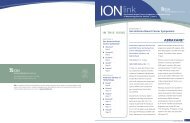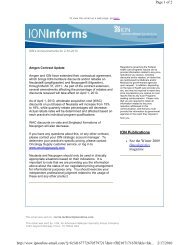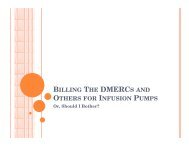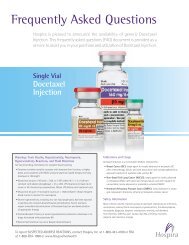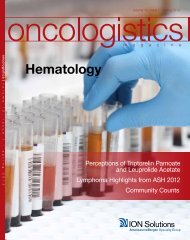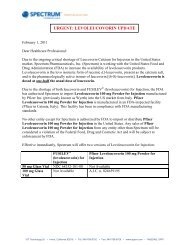First Quarter 2008 - Issues in Hematology - ION Solutions
First Quarter 2008 - Issues in Hematology - ION Solutions
First Quarter 2008 - Issues in Hematology - ION Solutions
- No tags were found...
You also want an ePaper? Increase the reach of your titles
YUMPU automatically turns print PDFs into web optimized ePapers that Google loves.
Proven efficacy <strong>in</strong> adjuvant stage III (Dukes’ C) colon cancer andmetastatic colorectal cancer 1-2Proven efficacy <strong>in</strong> metastatic breast cancer, regardless of HER2 status 3-5Dose modification does not appear to compromise efficacyacross <strong>in</strong>dications 5-8Established safety profileFor more <strong>in</strong>formation about XELODA, contact your Roche representative or visit www.xeloda.com.abdom<strong>in</strong>al pa<strong>in</strong> (10), vomit<strong>in</strong>g (5), and ileus (5). In XELODA monotherapy for metastatic breastcancer, the most common adverse events (≥10%) <strong>in</strong> patients receiv<strong>in</strong>g XELODA (%) werelymphopenia (94), anemia (72), diarrhea (57), hand-foot syndrome (57), nausea (53), fatigue (41),dermatitis (37), vomit<strong>in</strong>g (37), neutropenia (26), stomatitis (24), thrombocytopenia (24),anorexia (23), hyperbilirub<strong>in</strong>emia (22), paresthesia (21), abdom<strong>in</strong>al pa<strong>in</strong> (20), constipation (15),eye irritation (15), and pyrexia (12). Grade 3/4 adverse events (≥5%) <strong>in</strong> patients receiv<strong>in</strong>gXELODA were lymphopenia (59), diarrhea (15), hand-foot syndrome (11), hyperbilirub<strong>in</strong>emia (11),fatigue (8), stomatitis (7), and dehydration (5). In XELODA comb<strong>in</strong>ation therapy (XELODA plusdocetaxel) for breast cancer, the most common adverse events (≥10%) <strong>in</strong> patients receiv<strong>in</strong>gXELODA plus docetaxel (%) were lymphocytopenia (99), leukopenia (91), neutropenia/granulocytopenia (86), anemia (80), diarrhea (67), stomatitis (67), hand-foot syndrome (63),nausea (45), alopecia (41), thrombocytopenia (41), vomit<strong>in</strong>g (35), edema (33), abdom<strong>in</strong>al pa<strong>in</strong> (30),pyrexia (28), asthenia (26), fatigue (22), constipation (20), hyperbilirub<strong>in</strong>emia (20), neutropenicfever (16), taste disturbance (16), weakness (16), arthralgia (15), headache (15), myalgia (15),dyspnea (14), dyspepsia (14), nail disorder (14), anorexia (13), cough (13), pa<strong>in</strong> <strong>in</strong> limb (13),back pa<strong>in</strong> (12), dizz<strong>in</strong>ess (12), lacrimation <strong>in</strong>crease (12), paresthesia (12), sore throat (12),appetite decrease (10), and dehydration (10). Grade 3/4 adverse events (≥5%) <strong>in</strong> patients receiv<strong>in</strong>gXELODA plus docetaxel (%) were lymphocytopenia (89), leukopenia (61), neutropenia/granulocytopenia (69), hand-foot syndrome (24), stomatitis (18), neutropenic fever (16), diarrhea (15),anemia (10), hyperbilirub<strong>in</strong>emia (9), nausea (7), alopecia (6), vomit<strong>in</strong>g (5), and asthenia (5).Contra<strong>in</strong>dications and Warn<strong>in</strong>gsXELODA is contra<strong>in</strong>dicated <strong>in</strong> patients who have a known hypersensitivity to capecitab<strong>in</strong>e or toany of its components or to 5-fluorouracil. XELODA is contra<strong>in</strong>dicated <strong>in</strong> patients with knowndihydropyrimid<strong>in</strong>e dehydrogenase (DPD) deficiency. XELODA is contra<strong>in</strong>dicated <strong>in</strong> patients withsevere renal impairment. Patients with mild or moderate renal impairment at basel<strong>in</strong>e should becarefully monitored for adverse events. Patients with moderate renal impairment at basel<strong>in</strong>e requirea reduced start<strong>in</strong>g dose.XELODA can <strong>in</strong>duce diarrhea, sometimes severe. Patients with severe diarrheashould be carefully monitored and given fluid and electrolyte replacement ifthey become dehydrated.If an adverse event of grade 2, 3, or 4 occurs (eg, diarrhea), adm<strong>in</strong>istration of XELODAshould be immediately <strong>in</strong>terrupted until the adverse event resolves or decreases <strong>in</strong><strong>in</strong>tensity to grade 1. Subsequent doses of XELODA may need to be decreased. Pleaseconsult XELODA Prescrib<strong>in</strong>g Information for recommended dose modifications.Women of childbear<strong>in</strong>g potential should be advised to avoid becom<strong>in</strong>g pregnant whilereceiv<strong>in</strong>g treatment with XELODA. Men should use birth control while tak<strong>in</strong>g XELODA.Women should not nurse when receiv<strong>in</strong>g XELODA therapy.References: 1. Data on file (Ref. 111-041), Hoffmann-La Roche Inc., Nutley, NJ07110. 2. Van Cutsem E, Hoff PM, Harper P, et al. Oral capecitab<strong>in</strong>e vs <strong>in</strong>travenous5-fluorouracil and leucovor<strong>in</strong>: <strong>in</strong>tegrated efficacy data and novel analyses fromtwo large, randomised, phase III trials. Br J Cancer. 2004;90:1190-1197. 3. Tykerb[package <strong>in</strong>sert]. Research Triangle Park, NC: GlaxoSmithKl<strong>in</strong>e; 2007. 4. Ixempra[package <strong>in</strong>sert]. Pr<strong>in</strong>ceton, NJ: Bristol-Myers Squibb Company; 2007.5. O’Shaughnessy JA. Superior survival with the comb<strong>in</strong>ation of docetaxel andcapecitab<strong>in</strong>e compared to docetaxel alone <strong>in</strong> anthracycl<strong>in</strong>e-pretreated metastatic breastcancer patients. Am J Oncol Rev. 2002;1(5):280-285. 6. Cassidy J, Twelves C,Van Cutsem E, et al. <strong>First</strong>-l<strong>in</strong>e oral capecitab<strong>in</strong>e therapy <strong>in</strong> metastatic colorectal cancer:a favorable safety profile compared with <strong>in</strong>travenous 5-fluorouracil/leucovor<strong>in</strong>. AnnOncol. 2002;13:566-575. 7. Data on file (Ref. 111-036), Hoffmann-La Roche Inc.,Nutley, NJ 07110. 8. O’Shaughnessy J, Miles D, Vukelja S, et al. Superior survival withcapecitab<strong>in</strong>e plus docetaxel comb<strong>in</strong>ation therapy <strong>in</strong> anthracycl<strong>in</strong>e-pretreated patientswith advanced breast cancer: phase III trial results. J Cl<strong>in</strong> Oncol. 2002;20(12):2812-2823.Please see summary of XELODA Prescrib<strong>in</strong>g Information,<strong>in</strong>clud<strong>in</strong>g boxed WARNING, on adjacent pages.Copyright © <strong>2008</strong> Roche Laboratories Inc. All rights reserved.



